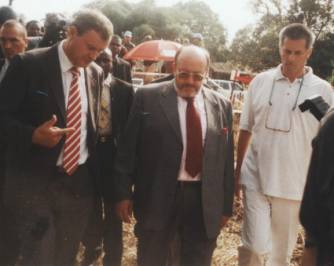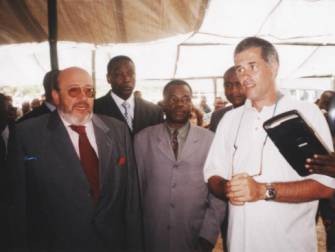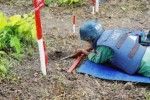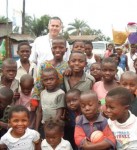Louis Michel a Kisangani
No se puede gestionar así como así un proyecto de 4 millones de Euros y la visita y control del poder político no solo es inevitable sino también deseable. Asi, casi sin aviso, las dos figuras centrales del gobierno belga desembarcaron en Kisangani. El VicePrimer Ministro y Ministro de Relaciones Exteriores, Louis Michel y el Ministro de la Cooperación Internacional Marc Verwilghen vinieron personalmente a interesarse en este proyecto que el gobierno belga apoya sin condiciones.
Un avión de la fuerza aérea belga los trajo, junto a medio centenar de periodistas. Visitaron el proyecto y prometieron continuar con el soporte financiero. lo que sigue es el comentario del sitio web de Handicap Internacional.
Louis Michel à Kisangani
Le ministre des Affaires Etrangères belge Louis Michel et le ministre de la Coopération Internationale, Marc Verwilghen, ont visité le projet de Handicap International Belgium à Kisangani en République Démocratique du Congo. Pendant la visite, les ministres ont reçu un témoignage de reconnaissance des villageois qui leur ont donné des Lacets Bleus, symbole de l’action de Handicap International pour les victimes des mines.
 La visite sur le terrain s’est déroulée à 11 kilomètres de Kisangani dans un petit village entouré de mines où plusieurs accidents ont eu lieu. Handicap International avec l’aide de la coopération belge travaillent à la dépolution de la ville de Kisangani des mines et autres UXO (munitions non explosées) et se sont engagées poursuivre leur travail afin de permettre la reprise du travail agricole, du commerce, de la libre circulation des personnes, et de tous les éléments indispensables à la relance de l’économie et du développement.
La visite sur le terrain s’est déroulée à 11 kilomètres de Kisangani dans un petit village entouré de mines où plusieurs accidents ont eu lieu. Handicap International avec l’aide de la coopération belge travaillent à la dépolution de la ville de Kisangani des mines et autres UXO (munitions non explosées) et se sont engagées poursuivre leur travail afin de permettre la reprise du travail agricole, du commerce, de la libre circulation des personnes, et de tous les éléments indispensables à la relance de l’économie et du développement.
Après sa visite sur le terrain, guidé par le directeur de Handicap International à Kisangani, Ignacio Séré, le ministre Louis Michel a déclaré : « Je crois qu’il faut tout d’abord remercier Handicap International et toute son équipe, ainsi que les démineurs locaux. Je voudrais vous dire en tout cas que notre présence ici signifie bien entendu que non seulement nous soutenons ce projet mais que nous allons poursuivre le soutien à ce projet, car nous savons l’importance qu’il a pour vous, pour votre vie quotidienne, pour la reprise de cette vie. Ceci est d’autant plus important que maintenant nous avons des raisons d’être optimiste. »
A son tour, M. Séré ajouté « le développement et l'investissement en République Démocratique du Congo sont freinés par des menaces qui persistent après la guerre. Handicap International Belgium, encouragé par la coopération belge entend bien poursuivre la formation de démineurs congolais, ceci afin d’avoir de nombreuses équipes prêtes à partir sur le terrain, et à répondre rapidement aux urgences des acteurs humanitaires et de développement. »
Le gouvernement congolais est d’ailleurs sérieusement préoccupé par le problème des mines qui sont un obstacle à la réunification parfaite du pays et à son développement, et qui menacent la vie de la population.» Et il a terminé par ceci: «je n’ai aucun doute que vous aurez des nouvelles à ce sujet d’ici peu de temps.»
(ENglish)
 Belgian Deputy Prime Minister Louis Michel and the new Minister for Development Cooperation, Mark Verwilghen, have visited the Handicap International project in Kisangani, Democratic Republic of Congo. During this visit the local population presented both ministers with a set of Blue Laces, the symbol of the organisation and battle against anti-personal mines.
Belgian Deputy Prime Minister Louis Michel and the new Minister for Development Cooperation, Mark Verwilghen, have visited the Handicap International project in Kisangani, Democratic Republic of Congo. During this visit the local population presented both ministers with a set of Blue Laces, the symbol of the organisation and battle against anti-personal mines.
The field trip took place in a small village approximately 11 kilometres from Kisangani. The village is surrounded by mine-fields and even now many of the locals become the victim of anti-personnel mines.
The Belgian Cooperation and Handicap International have worked to clear the mines from Kisangani in recent years and are now focusing on the areas around the city to clear the access for economic development. Minefields create a serious barrier to traffic, agriculture and local trade.
After the visit, Deputy Prime Minister Michel thanked the organisation and the local workers for their efforts through the years. He also explained that both ministers attending was a sign that they wish to support this project in the future. He highlighted the importance of the demining projects to the local population. "There is cause for optimism now daily life can go on without fear of accidents with anti-personnel mines."
Dr. Ignacio Séré, the Programme Director of Handicap international in the Democratic Republic of Congo, accompanied the two ministers on their visit. "The development and investment in the DRC is being restricted because of the threat of anti-personnel mines, that still exist after the fighting, " he said. "But in cooperation with the Congolese government and the Belgian operation we are at the moment analysing the possibility to open a National Centre for the Action against Anti-personnel mines and to man a national unit of de-miners by giving neccessary training to local employees. This way we can react quickly to the needs of the local population.
- Administrador's blog
- Login to post comments




